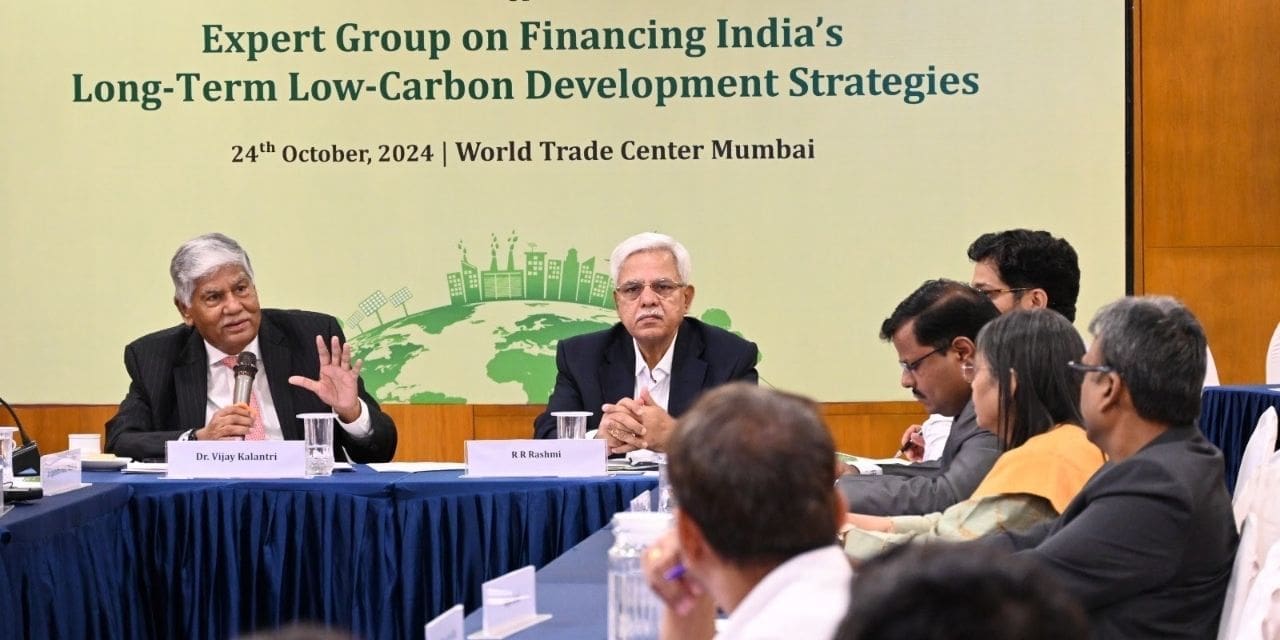MSMEs need support through credit guarantee for green bonds to adopt green technologies
Mumbai, October 25, 2024:A high-level discussion was organized by the TERI Expert Group on Financing India’s Long-Term Low Carbon Development Strategies (LT-LCDS) in collaboration with the World Trade Center Mumbai and the All-India Association of Industries (AIAI).
Key players from the financial and industrial sectors were present at the event, including representatives from the World Bank, Tata Cleantech Capital Limited, Axis Bank, SEBI, the Reserve Bank of India, and Nippon Steel. In order to overcome the financial obstacles that are essential to facilitating India’s shift to a low-carbon economy, the discussion emphasized the necessity of policy alignment and creative funding methods.
Mr. Pramod Rao, Executive Director of SEBI, provided information in his remarks regarding the steps the market watchdog has made to protect investors and encourage funding for legitimate decarbonization initiatives. “The Business Responsibility and Sustainability Report (BRSR) Core sustainability disclosure standard was introduced by SEBI for the top 150 listed companies in September of this year,” he stated. Third parties evaluate corporate disclosure under BRSR Core in comparison to BRSR, where disclosure is predicated on self-declaration. Mutual funds are required to invest at least 65% of the assets earned through their ESG fund schemes in BRSR Core-compliant businesses. The first nation to regulate ESG rating agencies is India. The nation’s ten to twelve registered ESG rating agencies are required to release three reports.
In his remarks, Mr. Pramod Rao, Executive Director, SEBI informed about the measures taken by the market regulator to safeguard investors and promote investment in genuine de-carbonisation projects. He said, “SEBI has implemented the sustainability disclosure norm Business Responsibility and Sustainability Report (BRSR) Core on top 150 listed companies from September this year. Under BRSR Core, corporate disclosure is assessed by third parties as against BRSR where disclosure is based on self-declaration.
Mr. Rao pointed out that SEBI has been taking these investor assurance measures to promote investor confidence and to sustain flow of funds into genuine decarbonization projects. He said, “In recent years, we are seeing strong inflow of funds from retail investors as reflected in high monthly inflows into mutual fund SIP schemes, increase in F&O trading and bullish trend in SME IPO market. The monthly inflow from mutual fund SIP schemes has grown from Rs. 23,000 crore/ month 10 years to Rs. 65 lakh crores in recent months. We need to sustain this inflow by building investor confidence through the above investor assurance measures.”
Speaking about the modes of funding corporate sustainability projects, Mr. Rao informed, “The country has created a market for green bonds since 2017 and now we have expanded the eligible list of green projects covered under this bond to include renewable and sustainable energy, sustainable waste management, bio diversity conservation, pollution control and prevention, to name a few. We have also introduced other funding instruments such as blue bonds (water management projects), yellow bonds (solar power projects) and transition bonds.”
Mr. Rao highlighted three areas of concern in promoting investment in de-carbonisation projects and aligning the long term funding requirement to our Nationally Determined Commitments (NDC) targets.
He said, “There is no greenium or lower cost of capital for green projects in India, unlike in foreign markets where Indian companies can issue green bonds at a lower cost. In foreign markets, there are dedicated investment funds with mandate to invest in green projects and hence companies are able to raise funds at lower cost (or benefit from greenium in foreign markets). In India, there is no mandate on insurance companies or long term pension funds to invest in green projects or ESG -linked projects.”
Another concern highlighted by Mr. Rao is ‘green washing’, where borrowers raise funds by making false claims to investors about the environment sustainability or ESG credentials of the project. He pointed out, “The increasing instance of ‘green washing’ leads to ‘green hushing’ where even genuine borrowers choose to under-report the green credentials of the project fearing allegations of ‘green washing’”
Dr. Vijay Kalantri, President – All India Association of Industries (AIAI), Chairman – World Trade Center, Mumbai; Board Director, World Trade Centers Association, New York emphasized, “Indian MSMEs need Rs. 17,000 crore to adopt energy saving technologies and Rs. 72,000 crore to invest on rooftop solar power. Government and financial institutions may support MSMEs in addressing this funding gap by earmarking dedicated funds for energy transition of MSME sector. MSMEs also need interest subvention on loans for green energy projects.”
Dr. Kalantri further suggested, “Indian MSMEs are unable to raise green bonds from foreign market due to poor credit rating. We need government support through credit enhancement and credit guarantee to enable MSMEs to raise green bonds at reasonable interest rate.”
Mr. Rashmi further informed, “Government of India is preparing sectoral energy transition roadmap as part of its Low Emission Development Strategy. Specifically, government is working on introducing energy intensity reduction targets for around nine sectors covered under Energy Conservation Act. Once these targets are introduced, it will pave the way for indirect carbon pricing and development of active carbon trading market in the country.”
The roundtable explored strategies to facilitate sustainable industrial growth / the transition, particularly focusing on the decarbonizing of the supply chain and hard-to-abate sectors such as steel and cement. Participants emphasized the need to align India’s economic activities with climate-positive initiatives to support the country’s net-zero emissions target for 2070, announced at COP26 in Glasgow. The deliberations reflected on the need for multilateral support, innovative technologies, and tailored financing models to meet the evolving challenges of low-carbon development.

